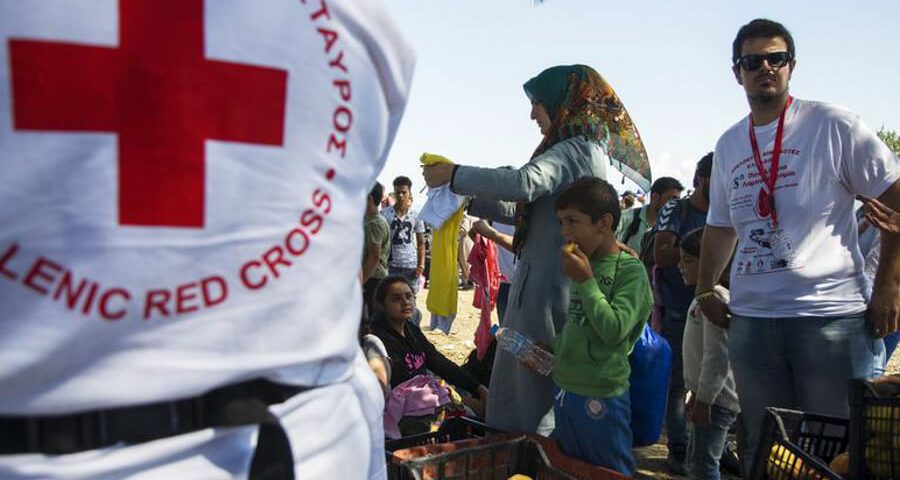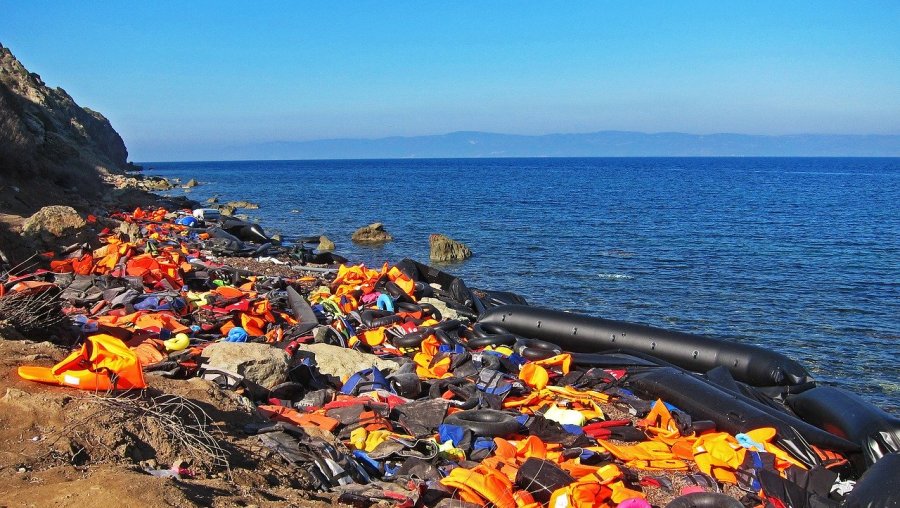
*This text is an answer to the question of Pascal Detzler “How is Healthcare for Asylum Seekers Regulated in the EU and in Russia?”
Right to healthcare
The Polish Constitution guarantees a right to healthcare to everybody – citizens of Poland and foreigners alike1Article 68. of the Constitution of the Republic of Poland of 1997, Journal of Law 1997, 78, 483 [Konstytucja Rzeczypospolitej Polskiej, Dz.U. 1997 nr 78 poz. 483]. See also: Prawo i Medycyna nr 47/ XI 2012, “Dostęp cudzoziemców do bezpłatnych świadczeń opieki zdrowotnej w Polsce”, http://www.prawoimedycyna.pl/index.php?str=artykul&id=1335, date of Access: 15.01.2017. However, it also states that an equal access to public healthcare services is restricted to Polish citizens. According to the Law on healthcare services financed from public funds, the access itself is based upon one’s status of an ”insurance holder” (ubezpieczony) – i.e. a person insured with the National Health Fund (Narodowy Fundusz Zdrowia, hereafter: NFZ)2 Law on healthcare services financed from public funds of 27 August 2004, Journal of Law 2004 [Ustawa z dnia 27 sierpnia 2004 r. o świadczeniach opieki zdrowotnej finansowanych ze środków publicznych, Dz.U. 2004 nr 210 poz. 2135]. Only citizens of EU/EFTA countries and certain groups of third-country nationals (TCNs, e.g. work visa holders, temporary and permanent residents, recognised refugees and beneficiaries of subsidiary protection) can be considered ”insurance holders”3Art. 3.1.2. of the Law on healthcare services financed from public funds. Public services can also be provided to other categories of TCNs and, in this case, their scope is laid down in specific acts regulating their status.
Under the law on protection4Art. 73.1 and 2 of the Law on granting protection to foreigners in the territory of Poland, asylum seekers are granted healthcare services equal in scope to those offered to Poles with the exception of sanatorium treatment and sanatorium rehabilitation. However, medical services are offered to this groups only by service providers contracted by the Office for Foreigners which is the first-instance asylum authority. Recognised refugees and beneficiaries of subsidiary protection are a category of TCNs considered ”insurance holders” and are thus entitled to exactly the same services as Poles, under the condition of having a valid health insurance.
Access to medical services in practice
Asylum seekers
At present, medical assistance to asylum seekers is administered by the Warsaw‑based company Petra Medica Sp. z o.o. contracted by the Office Foreigners in 2015. Healthcare services are provided in reception centres (basic treatment and diagnostics) and specialist medical units outside the centres. In addition, asylum seekers receive psychological consultations and dental treatment5Information from the Office for Foreigners website: http://udsc.gov.pl/uchodzcy-2/pomoc-socjalna/system-pomocy-socjalnej/rodzaje-przyznawanej-pomocy/. One of the greatest challenges of this system is that some clinics and hospitals providing services to asylum seekers under the contract are situated far away from the reception centres and asylum seekers cannot refer to the closest medical facility, which generates additional travel costs6N. Klorek, ”Ochrona zdrowia nieudokumentowanych migrantów i osób ubiegających się o ochronę międzynarodową w opinii cudzoziemców”, in: A. Chrzanowska, W. Klaus (eds.), Poza systemem. Dostęp do ochrony zdrowia nieudokumentowanych migrantów i cudzoziemców ubiegających się o ochronę międzynarodową w Polsce, Warsaw 2011, Association for Legal Intervention, Huma Network, pp. 93-94, available at: http://interwencjaprawna.pl/docs/poza-systemem.pdf, date of access: 17.01.2017.
Recognised refugees
As mentioned above, beneficiaries of international protection are entitled to the same services as Poles provided they are insured with the NFZ. In Poland, both refugees and subsidiary protection holders benefit from a 12-month Individidual Integration Program (IPI) that foresees various forms of assistance (financial, social, psychological and linguistic)7 Art. 93. of the Law on integration assistance of 12 March 2004, Journal of Law 2004 [Ustawa z dnia 12 marca 2004 r. o pomocy społecznej, Dz.U. 2004 nr 64 poz. 593]. Beneficiaries of the programme are obliged to register with a regional job centre which grants them a health insurance. After the IPI has been completed, the obligation to pay premiums lies with the employer, a regional job centre, social assistance centre or the refugee, depending on the situation.
The health insurance with the NFZ covers both basic and specialist medical services, vaccinations, diagnostic testing, rehabilitation, hospital care, rescue services and medical transport. It does not, however, cover some dentistry procedures, costs of medicines, auxiliary products or orthopaedic equipment.
Selected problems
Linguistic and intercultural competences of medical personnel
One of the challenges asylum seekers face in accessing healthcare is insufficient knowledge of foreign languages among doctors and nurses. In general, Polish authorities do not provide interpretation free of charge, however there is an exception with regard to asylum seekers. Under the agreement between the Office for Foreigners, the contractor is obliged to ensure interpretation during medical and psychological consultation, if needed8Letter from the Head of the Office for Foreigners to HFHR of 27 August 2015 no. BSZ-0811/1429/15/RW, cited in: K. Rusilowicz, M. Łysienia and E. Ostaszewska-Żuk, Country Report – Poland, ECRE Asylum Information Database, November 2015, available at: goo.gl/4mfHk4, date of access: 17.01.2017.
Observations of the Helsinki Foundation for Human Rights (HFHR) show that many doctors do speak foreign languages (most often English or Russian), however there are also cases where asylum seekers cannot communicate with the medical personnel. These cases were reported to the HFHR by French and Arabic-speaking asylum seekers who sought medical assistance in Warsaw. In response to the HFHR’s letter9HFHR letter to the Head of the Office for Foreigners of 13 September 2016, L.Dz. 1765/2016/BD, the Office for Foreigners replied that the contracted medical company had established a translation department to solve this problem10Letter from the Head of the Office for Foreigners to HFHR of 25 October 2016 no. DPS.WII.510.556.2016/KH.
Experts point also to the problem of insufficient intercultural competences among medical personnel, resulting from the lack of theoretical and practical courses dedicated to intercultural diagnostics and communication11H. Grzymała-Moszczyńska, ”Uchodźcy jako wyzwanie dla polskiego systemu opieki zdrowotnej”, in: A. Chrzanowska, W. Klaus (eds.), Poza systemem. Dostęp do ochrony zdrowia nieudokumentowanych migrantów i cudzoziemców ubiegających się o ochronę międzynarodową w Polsce, p. 143. These gaps are often filled by cultural mediators, employed by NGOs, who assist migrants in settling everyday matters, including at medical appointments. However, their operational capacity may vary as organisations depend mostly on project-based funding.
Mental health
Healthcare for asylum seekers includes the treatment of persons suffering from mental health problems. Psychologists work in all reception centres at least four hours a week for every 120 asylum seekers12Letter from the Head of the Office for Foreigners of 27 August 2015. This assistance is limited to basic consultations and does not include therapy. If necessary, an asylum seeker can be referred to a psychiatrist or a psychiatric hospital. Experts consider the scope of this assistance and the number of contracted psychologists insufficient to respond to the needs of asylum seekers, as this population comprises, among others, victims of violence or persons suffering from the post-traumatic stress disorder (PTSD) who may require more intensive and specific treatment. In particular, more child psychologists and psychologists trained in the treatment of trauma are needed13M. Książak, ”Dostęp do pomocy medycznej i psychologicznej osób ubiegających się o status uchodźcy w Polsce”, in A. Chrzanowska, W. Klaus, Poza systemem. Dostęp do ochrony zdrowia nieudokumentowanych migrantów i cudzoziemców ubiegających się o ochronę międzynarodową w Polsce, pp. 180-182. In addition to the assistance ensured by the state, there are currently three specialised NGOs that provide psychological consultations and treatment to asylum seekers14Ocalanie Foundation (Fundacja Ocalenie): http://ocalenie.org.pl/en/, International Humanitarian Initiative (Fundacja Międzynarodowa Inicjatywa Humanitarna): goo.gl/XwkpcA, Roznosfera Foundation (Fundacja Różnosfera): http://www.roznosfera.org/.
Victims of torture
Although there are no official statistics on the number of victims of torture among asylum seekers in Poland, the experience of NGOs shows that a significant proportion of forced migrants have experienced some forms of torture in their countries of origin. For many years, the vast majority of asylum seekers in Poland have been arriving from Chechnya – Russia’s North Caucasus republic with a poor human rights record and systematic and widespread use of torture by law enforcement structures15Reports on the human rights situation in Chechnya: Memorial Human Rights Centre, Counter-terrorism in the North Caucasus: a human rights perspective 2014 – first half of 2016, 2016, http://memohrc.org/reports/kontrterror-na-severnom-kavkaze-vzglyad-pravozashchitnikov-2014-g-pervaya-polovina-2016-g; Human Rights Watch, Like Walking a Minefield, 2016, https://www.hrw.org/report/2016/08/30/walking-minefield/vicious-crackdown-critics-russias-chechen-republic; Amnesty International, Report on Russian Federation 2015/2016, https://www.amnesty.org/en/countries/europe-and-central-asia/russian-federation/report-russian-federation/.
In 2015, an important amendment was introduced to the Law on granting protection to foreigners, placing on the asylum authority the responsibility for due examination if an asylum seeker belongs to a vulnerable group of persons (e.g. is a victim of torture)16Art. 68.1 of the Law on granting protection to foreigners, as amended in November 2015. In the course of the asylum procedure, the Office for Foreigners is obliged to examine if the applicant should be considered vulnerable on one or more grounds17Art. 68.1 of the Law on granting protection to foreigners lists the following vulnerable groups: minors, disabled persons, elderly, pregnant women, single parents, bedridden patients, persons with mental illness, victims of torture, victims of psychological, physical (including sexual) violence and violence based on gender, sexual orientation and sexual identity and thus entitled to special treatment. It is an important change, as prior to the amendment the process of identification of vulnerable groups was based solely on ineffective self-identification mechanisms18See more: K. Rusilowicz, M. Łysienia and E. Ostaszewska-Żuk, Country Report – Poland, pp. 35-36.
Special assistance to vulnerable asylum seekers should be provided with regard to accommodation, medical and psychological treatment or dietary requirements. Vulnerable asylum seekers should also be granted special procedural guarantees in the course of the refugee status determination procedure, including conditions adapted to their mental and physical state, the presence of a psychologist or doctor during the interview or a possibility to be interviewed at one’s place of residence19Art. 68 of the Law on granting protection to foreigners. Importantly, the law also provides that if an applicant’s mental and physical state indicate that they might have been a victim of violence, they should not be placed in detention centres20Art. 88a 3.2 of the Law on granting protection to foreigners.
Despite some improvements, including also the elaboration of screening questionnaires to be used by psychologists in reception centres21In 2015, the Office of Foreigners in cooperation with the Roznosfera Foundation and the Border Guard started a project dedicated to improving identificiation of vulnerable groups in the asylum procedures in the framework of which a screening tool was developed: goo.gl/dKL6hg, as well as the introduction by the Border Guard of an algorithm on the treatment of vulnerable asylum seekers22Letter from the Border Guard Headquarters to HFHR of 24 August 2015 no. FAX-KG-CU-5944/IP/15, cited in: K. Rusilowicz, M. Łysienia and E. Ostaszewska-Żuk, Country Report – Poland, ECRE Asylum Information Database, November 2015, available at: goo.gl/4mfHk4, date of access: 17.01.2017, the problem of identification of vulnerable persons remains a challenge. For example, a recent regulation of the Ministry of Health with regard to the “medical examination and hygiene measures of the body and clothing of asylum seekers” focuses solely on screening and prevention of infectious diseases and ignores the role that medical examination could and should play in identifying survivors of torture23Regulation of the Minister of Health on medical examination and hygiene measures of the body and clothing of asylum seekers of 14 October 2016, Journal of Law 2016 [Rozporządzenie Ministra Zdrowia z dnia 14 października 2016 r. w sprawie badań lekarskich oraz zabiegów sanitarnych ciała i odzieży cudzoziemca ubiegającego się o udzielenie ochrony międzynarodowej, Dz.U. 2016 r. poz. 1724]. Legal practitioners continue to come across Border Guard decisions ordering detention of victims of torture or other forms of violence and challenge them before national and international courts24M. Górczyńska, ‘Uchodźcy – procesy za pozbawienie wolności, Rzeczpospolita, 8 July 2016, http://www.rp.pl/Opinie/307089963-Uchodzcy-procesy-za-pozbawienie-wolnosci.html#ap-1, date of access: 18.01.2017.
Experts note also that specialised treatment for victims of torture or traumatised asylum seekers is not available in practice in Poland because of lack of qualified psychologists and therapists specializing in treating trauma, in particular in an intercultural context25M. Książak, ”Dostęp do pomocy medycznej i psychologicznej osób ubiegających się o status uchodźcy w Polsce”, in A. Chrzanowska, W. Klaus, Poza systemem. Dostęp do ochrony zdrowia nieudokumentowanych migrantów i cudzoziemców ubiegających się o ochronę międzynarodową w Polsce, pp. 180-182. Assistance provided by specialists working for non-governmental organisations is not sufficient to fill the systemic gaps. Ideally, an effective assistance to victims of serious abuses should be based on an interdisciplinary approach where a team of lawyers, psychologists/psychiatrists and social assistants work together to ensure the respect for procedural guarantees, specialised treatment and future integration of the assisted person.
Conclusions
In general terms, Polish law does not restrict the access to healthcare of asylum seekers and refugees. With the exception of sanatorium treatment and rehabilitation for asylum seekers, those groups are entitled to the same healthcare services as Polish citizens. Nevertheless, practical challenges to the effectiveness and quality of services persist. They relate in particular to the insufficient linguistic and intercultural competences of medical staff and lack of a proper identifications of vulnerable groups that may require special assistance, such as the victims of torture.
Bibliography
Legal acts
Constitution of the Republic of Poland of 1997, Journal of Law 1997, 78, 483 [Konstytucja Rzeczypospolitej Polskiej, Dz.U. 1997 nr 78 poz. 483].
Law on foreigners of 12 December 2013, Journal of Law 2013, 1650 [Ustawa o cudzoziemcach z 12 grudnia 2013, Dz.U. z 2013, nr 1650]; English translation is available here: http://cudzoziemcy.gov.pl/uploads/ngrey/prawo/ACT%20of%2012%20December%202013%20ON%20FOREIGNERS.pdf
Law on granting protection to foreigners in the territory of Poland of 13 June 2004 [Ustawa z dnia 13 czerwca 2003 r. o udzielaniu cudzoziemcom ochrony na terytorium Rzeczypospolitej Polskiej, Dz.U. 2003 nr 128 poz. 1176].
Law on healthcare services financed from public funds of 27 August 2004, Journal of Law 2004 [Ustawa z dnia 27 sierpnia 2004 r. o świadczeniach opieki zdrowotnej finansowanych ze środków publicznych Dz.U. 2004 nr 210 poz. 2135].
Law on integration assistance of 12 March 2004, Journal of Law 2004 [Ustawa z dnia 12 marca 2004 r. o pomocy społecznej, Dz.U. 2004 nr 64 poz. 593].
Law on the Pole’s Card of 7 September 2007, Journal of Law 2007 [Ustawa z dnia 7 września 2007 r. o Karcie Polaka, Dz.U. 2007 nr 180 poz. 1280].
Regulation of the Minister of Health on medical examination and hygiene measures of the body and clothing of asylum seekers of 14 October 2016, Journal of Law 2016 [Rozporządzenie Ministra Zdrowia z dnia 14 października 2016 r. w sprawie badań lekarskich oraz zabiegów sanitarnych ciała i odzieży cudzoziemca ubiegającego się o udzielenie ochrony międzynarodowej, Dz.U. 2016 r. poz. 1724].
Book chapter and articles
Górczyńska, M., ‘Uchodźcy – procesy za pozbawienie wolności, Rzeczpospolita, 8 July 2016, http://www.rp.pl/Opinie/307089963-Uchodzcy-procesy-za-pozbawienie-wolnosci.html#ap-1, date of Access: 18.01.2017.
Grzymała-Moszczyńska, H., ‘Uchodźcy jako wyzwanie dla polskiego systemu opieki zdrowotnej’, in: A. Chrzanowska, W. Klaus (eds.), Poza systemem. Dostęp do ochrony zdrowia nieudokumentowanych migrantów i cudzoziemców ubiegających się o ochronę międzynarodową w Polsce, p. 143.
Klorek, N., ‘Ochrona zdrowia nieudokumentowanych migrantów i osób ubiegających się o ochronę międzynarodową w opinii cudzoziemców, in: A. Chrzanowska, W. Klaus (eds.), Poza systemem. Dostęp do ochrony zdrowia nieudokumentowanych migrantów i cudzoziemców ubiegających się o ochronę międzynarodową w Polsce, Warsaw 2011, Association for Legal Intervention, Huma Network, pp. 93-94, available at: http://interwencjaprawna.pl/docs/poza-systemem.pdf, date of access: 17.01.2017.
Książak, M., ‘Dostęp do pomocy medycznej i psychologicznej osób ubiegających się o status uchodźcy w Polsce’, in A. Chrzanowska, W. Klaus, Poza systemem. Dostęp do ochrony zdrowia nieudokumentowanych migrantów i cudzoziemców ubiegających się o ochronę międzynarodową w Polsce, pp. 180-182.
Mazur, N., ‘MSWiA ma miliony na integrację cudzoziemców, ale w 2016 r. nie wydało na to ani złotówki, Gazeta Wyborcza, 9 November 2017, available at: http://wyborcza.pl/7,75398,21216958,mswia-ma-miliony-na-integracje-cudzoziemcow-ale-w-2016-r-nie.html?disableRedirects=true, date of Access: 18.01.2017.
Prawo i Medycyna nr 47/ XI 2012, ‘Dostęp cudzoziemców do bezpłatnych świadczeń opieki zdrowotnej w Polsce’, http://www.prawoimedycyna.pl/index.php?str=artykul&id=1335, date of Access: 15.01.2017.
Reports
Amnesty International, Report on Russian Federation 2015/2016, https://www.amnesty.org/en/countries/europe-and-central-asia/russian-federation/report-russian-federation/.
Human Rights Watch, Like Walking a Minefield, 2016, https://www.hrw.org/report/2016/08/30/walking-minefield/vicious-crackdown-critics-russias-chechen-republic.
Memorial Human Rights Centre, Counter-terrorism in the North Caucasus: a human rights perspective 2014 – first half of 2016, 2016, http://memohrc.org/reports/kontrterror-na-severnom-kavkaze-vzglyad-pravozashchitnikov-2014-g-pervaya-polovina-2016-g.
Rusilowicz, K., Łysienia, M. and Ostaszewska-Żuk, E. Country Report – Poland, ECRE Asylum Information Database, November 2015, available at: goo.gl/4mfHk4.
Letters and responses to letters of inquiry
Letter from the Border Guard Headquarters to HFHR of 24 August 2015 no. FAX-KG-CU-5944/IP/15, cited in: K. Rusilowicz, M. Łysienia and E. Ostaszewska-Żuk, Country Report – Poland, ECRE Asylum Information Database, November 2015, available at: goo.gl/4mfHk4, date of access: 17.01.2017.
Letter from the Head of the Office for Foreigners to HFHR of 27 August 2015 no. BSZ-0811/1429/15/RW, cited in: K. Rusilowicz, M. Łysienia and E. Ostaszewska-Żuk, Country Report – Poland, ECRE Asylum Information Database, November 2015, available at: goo.gl/4mfHk4, date of access: 17.01.2017.
Letter from the Head of the Office for Foreigners to HFHR of 25 October 2016 no. DPS.WII.510.556.2016/KH.
Letter from HFHR to the Head of the Office for Foreigners of 13 September 2016, L.Dz. 1765/2016/BD.
Websites
Information from the Office for Foreigners website: http://udsc.gov.pl/uchodzcy-2/pomoc-socjalna/system-pomocy-socjalnej/rodzaje-przyznawanej-pomocy/.
International Humanitarian Initiative (Fundacja Międzynarodowa Inicjatywa Humanitarna): goo.gl/XwkpcA.
Ocalanie Foundation (Fundacja Ocalenie): http://ocalenie.org.pl/en/.
Roznosfera Foundation (Fundacja Różnosfera): http://www.roznosfera.org/.[:]
Similar Posts:
- Право на здоровье и доступ к медицинской помощи: положение просящих убежища и международной защиты в Польше
- Defending the right to seek asylum: a perspective from Poland
- Право на поиск убежища – взгляд из Польши
References
| ↑1 | Article 68. of the Constitution of the Republic of Poland of 1997, Journal of Law 1997, 78, 483 [Konstytucja Rzeczypospolitej Polskiej, Dz.U. 1997 nr 78 poz. 483]. See also: Prawo i Medycyna nr 47/ XI 2012, “Dostęp cudzoziemców do bezpłatnych świadczeń opieki zdrowotnej w Polsce”, http://www.prawoimedycyna.pl/index.php?str=artykul&id=1335, date of Access: 15.01.2017 |
|---|---|
| ↑2 | Law on healthcare services financed from public funds of 27 August 2004, Journal of Law 2004 [Ustawa z dnia 27 sierpnia 2004 r. o świadczeniach opieki zdrowotnej finansowanych ze środków publicznych, Dz.U. 2004 nr 210 poz. 2135] |
| ↑3 | Art. 3.1.2. of the Law on healthcare services financed from public funds |
| ↑4 | Art. 73.1 and 2 of the Law on granting protection to foreigners in the territory of Poland |
| ↑5 | Information from the Office for Foreigners website: http://udsc.gov.pl/uchodzcy-2/pomoc-socjalna/system-pomocy-socjalnej/rodzaje-przyznawanej-pomocy/ |
| ↑6 | N. Klorek, ”Ochrona zdrowia nieudokumentowanych migrantów i osób ubiegających się o ochronę międzynarodową w opinii cudzoziemców”, in: A. Chrzanowska, W. Klaus (eds.), Poza systemem. Dostęp do ochrony zdrowia nieudokumentowanych migrantów i cudzoziemców ubiegających się o ochronę międzynarodową w Polsce, Warsaw 2011, Association for Legal Intervention, Huma Network, pp. 93-94, available at: http://interwencjaprawna.pl/docs/poza-systemem.pdf, date of access: 17.01.2017 |
| ↑7 | Art. 93. of the Law on integration assistance of 12 March 2004, Journal of Law 2004 [Ustawa z dnia 12 marca 2004 r. o pomocy społecznej, Dz.U. 2004 nr 64 poz. 593] |
| ↑8 | Letter from the Head of the Office for Foreigners to HFHR of 27 August 2015 no. BSZ-0811/1429/15/RW, cited in: K. Rusilowicz, M. Łysienia and E. Ostaszewska-Żuk, Country Report – Poland, ECRE Asylum Information Database, November 2015, available at: goo.gl/4mfHk4, date of access: 17.01.2017 |
| ↑9 | HFHR letter to the Head of the Office for Foreigners of 13 September 2016, L.Dz. 1765/2016/BD |
| ↑10 | Letter from the Head of the Office for Foreigners to HFHR of 25 October 2016 no. DPS.WII.510.556.2016/KH |
| ↑11 | H. Grzymała-Moszczyńska, ”Uchodźcy jako wyzwanie dla polskiego systemu opieki zdrowotnej”, in: A. Chrzanowska, W. Klaus (eds.), Poza systemem. Dostęp do ochrony zdrowia nieudokumentowanych migrantów i cudzoziemców ubiegających się o ochronę międzynarodową w Polsce, p. 143 |
| ↑12 | Letter from the Head of the Office for Foreigners of 27 August 2015 |
| ↑13, ↑25 | M. Książak, ”Dostęp do pomocy medycznej i psychologicznej osób ubiegających się o status uchodźcy w Polsce”, in A. Chrzanowska, W. Klaus, Poza systemem. Dostęp do ochrony zdrowia nieudokumentowanych migrantów i cudzoziemców ubiegających się o ochronę międzynarodową w Polsce, pp. 180-182 |
| ↑14 | Ocalanie Foundation (Fundacja Ocalenie): http://ocalenie.org.pl/en/, International Humanitarian Initiative (Fundacja Międzynarodowa Inicjatywa Humanitarna): goo.gl/XwkpcA, Roznosfera Foundation (Fundacja Różnosfera): http://www.roznosfera.org/ |
| ↑15 | Reports on the human rights situation in Chechnya: Memorial Human Rights Centre, Counter-terrorism in the North Caucasus: a human rights perspective 2014 – first half of 2016, 2016, http://memohrc.org/reports/kontrterror-na-severnom-kavkaze-vzglyad-pravozashchitnikov-2014-g-pervaya-polovina-2016-g; Human Rights Watch, Like Walking a Minefield, 2016, https://www.hrw.org/report/2016/08/30/walking-minefield/vicious-crackdown-critics-russias-chechen-republic; Amnesty International, Report on Russian Federation 2015/2016, https://www.amnesty.org/en/countries/europe-and-central-asia/russian-federation/report-russian-federation/ |
| ↑16 | Art. 68.1 of the Law on granting protection to foreigners, as amended in November 2015 |
| ↑17 | Art. 68.1 of the Law on granting protection to foreigners lists the following vulnerable groups: minors, disabled persons, elderly, pregnant women, single parents, bedridden patients, persons with mental illness, victims of torture, victims of psychological, physical (including sexual) violence and violence based on gender, sexual orientation and sexual identity |
| ↑18 | See more: K. Rusilowicz, M. Łysienia and E. Ostaszewska-Żuk, Country Report – Poland, pp. 35-36 |
| ↑19 | Art. 68 of the Law on granting protection to foreigners |
| ↑20 | Art. 88a 3.2 of the Law on granting protection to foreigners |
| ↑21 | In 2015, the Office of Foreigners in cooperation with the Roznosfera Foundation and the Border Guard started a project dedicated to improving identificiation of vulnerable groups in the asylum procedures in the framework of which a screening tool was developed: goo.gl/dKL6hg |
| ↑22 | Letter from the Border Guard Headquarters to HFHR of 24 August 2015 no. FAX-KG-CU-5944/IP/15, cited in: K. Rusilowicz, M. Łysienia and E. Ostaszewska-Żuk, Country Report – Poland, ECRE Asylum Information Database, November 2015, available at: goo.gl/4mfHk4, date of access: 17.01.2017 |
| ↑23 | Regulation of the Minister of Health on medical examination and hygiene measures of the body and clothing of asylum seekers of 14 October 2016, Journal of Law 2016 [Rozporządzenie Ministra Zdrowia z dnia 14 października 2016 r. w sprawie badań lekarskich oraz zabiegów sanitarnych ciała i odzieży cudzoziemca ubiegającego się o udzielenie ochrony międzynarodowej, Dz.U. 2016 r. poz. 1724] |
| ↑24 | M. Górczyńska, ‘Uchodźcy – procesy za pozbawienie wolności, Rzeczpospolita, 8 July 2016, http://www.rp.pl/Opinie/307089963-Uchodzcy-procesy-za-pozbawienie-wolnosci.html#ap-1, date of access: 18.01.2017 |


